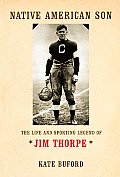 Describe your latest book.
Describe your latest book.Native American Son: The Life and Sporting Legend of Jim Thorpe, a biography of America's greatest all-around athlete. After writing a book about the movies — Burt Lancaster: An American Life — I wanted to jump into the other great area of modern culture and expression, sports. Thorpe (1887-1953) was the first international celebrity athlete at the dawn of organized sports and an American Indian. His life is a cautionary tale of great gifts, passionate fan loyalty, exploitation, trust betrayed, inner demons, feckless waste, and profound regrets. I wrote the book in part to see what the patterns of his life could teach us about how we regard sports and the men and women who play them today. Thorpe's life had never been thoroughly examined and it seemed like a big gap in our history that needed to be filled in.
Why do you write?
To find out what happened and why. It's a compulsion and often a dangerous one. At one point I realized I was getting too involved — as a friend or otherwise — with sketchy people because I wanted to solve the mystery of their crazy lives. Like walking into a book. Now I confine my curiosity, mostly, to my work.
Offer a favorite sentence or passage from another writer.
The last paragraph of George Eliot's Middlemarch:
But the effect of her being on those around her was incalculably diffusive: for the growing good of the world is partly dependent on unhistoric acts; and that things are not so ill with you and me as they might have been, is half owing to the number who lived faithfully a hidden life, and rest in unvisited tombs.
Introduce one other author you think people should read, and suggest a good place to start.
A. L. Kennedy. I was blown away by Day, her 2007 novel about an RAF airman. This early passage captures her blend of vivid characterization and deft humor:
The trouble was, you had too much to do: breathing, sleeping, waking, eating: you couldn't avoid them, were built to need them, and so they just went on and on. Where were the other possibilities, the changes you might want to make — like walking off beneath the ocean — not being a fish, he bloody hated fish, but being a man tucked away in the ocean, why couldn't he try that? Why couldn't he try out whatever he thought?And thinking itself, that wasn't helpful and yet you had to do it all the time.
What makes your favorite pair of shoes better than the rest?
Don't get me started on shoes. There are so many favorites, but here are two: deep purple open-toed high-heeled matte satin pumps; and green lizardy-looking criss-cross strappy high heels. And the black lace-up boots. And the brown leather moccasins I wore while writing Native American Son.
Describe the best breakfast of your life.
The Four Aces diner in West Lebanon, New Hampshire. Eggs, bacon, sausage, and lots of coffee to wash it all down.
If you could choose any story to live in, what story would that be? Why?
The Fourth Bear by Jasper Fforde. When I picked up a copy in the Bristol (U.K.) airport and read on the back cover, "But all is not what it seems. How could the bears' porridge be at such disparate temperatures when they were poured at the same time?" I thought, Ah-ha! and knew I was in for a treat. I'm putting off reading The Eyre Affair because then I'll have read it and can't read it again for the first time.
What's the strangest or most interesting job you've ever had?
Reading German legal texts for a blind law school professor. German is not hard to pronounce compared to French and I evidently had a good "Hoch Deutsch" accent after living a year in Germany. I had no idea, however, what I was reading about.
Aside from other writers, name some artists from whom you draw inspiration and talk a little about their work.
Buddy Guy. Van Morrison. Al Green. Flatt and Scruggs. Patsy Cline. Jerry Lee Lewis. Hank Jones. They inspire for their skill, passion, energy, heart, and soul. Somebody — Ruskin, maybe — said that all art should aspire to the condition of music. (No, it was Walter Pater. Thank you, Google.)
Is there a book you wish you'd written?
You mean other than War and Peace? The Devil in the White City. Erik Larson did a brilliant job of pulling together parallel story lines — one of them creepily sensational — and telling the narrative straight. When I finished it I thought, Damn, I wish I'd written that.
Five books on a single topic of interest:
Native American Son introduced me to many books on American Indian history and literature. Here are some of my favorites:
The Surrounded by Darcy McNickle
House Made of Dawn by N. Scott Momaday
Why I Can't Read Wallace Stegner by Elizabeth Cook-Lynn
And Still the Waters Run: The Betrayal of the Five Civilized Tribes by Angie Debo
Black Hawk: An Autobiography